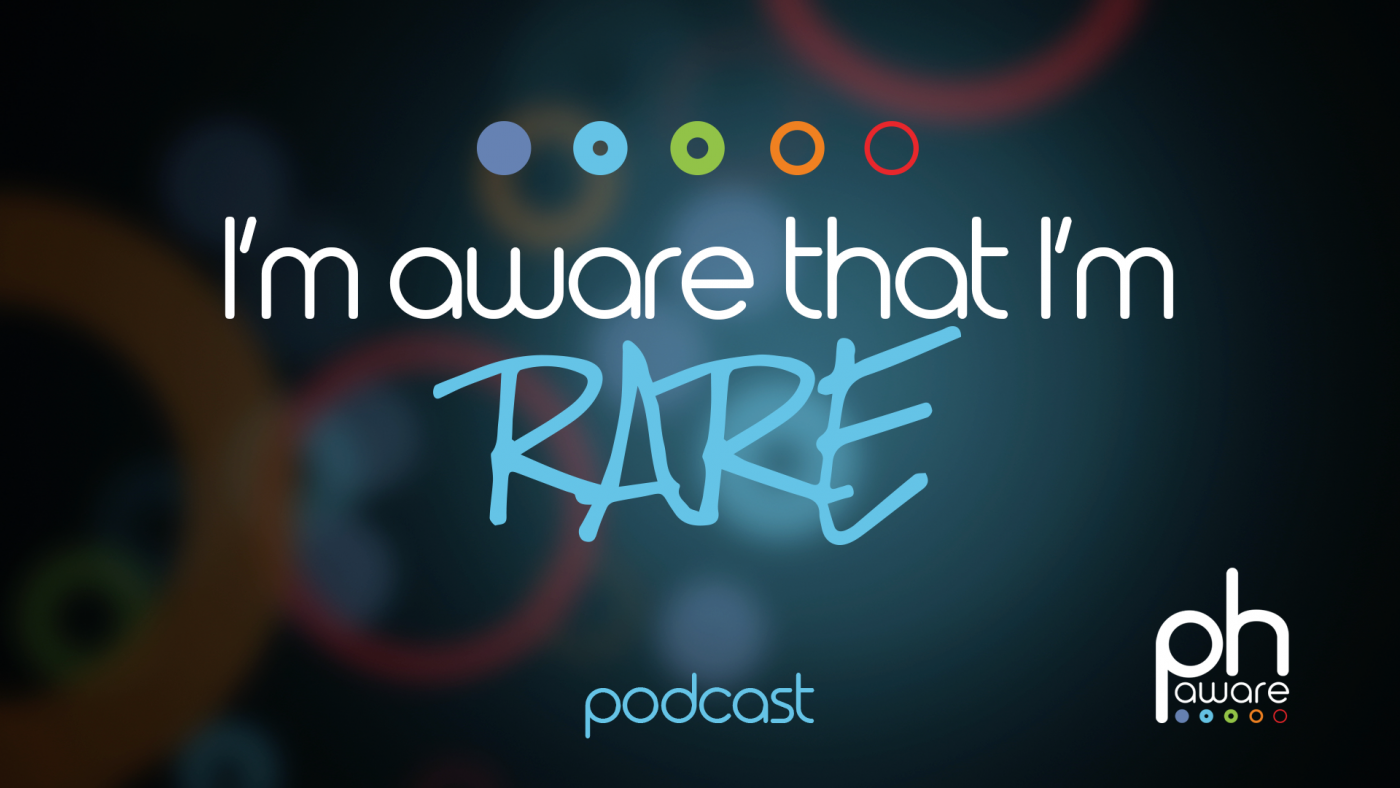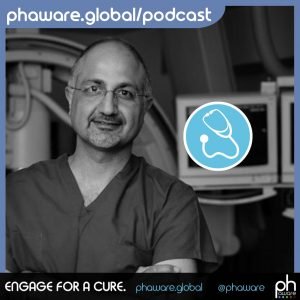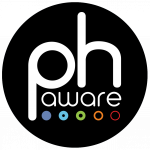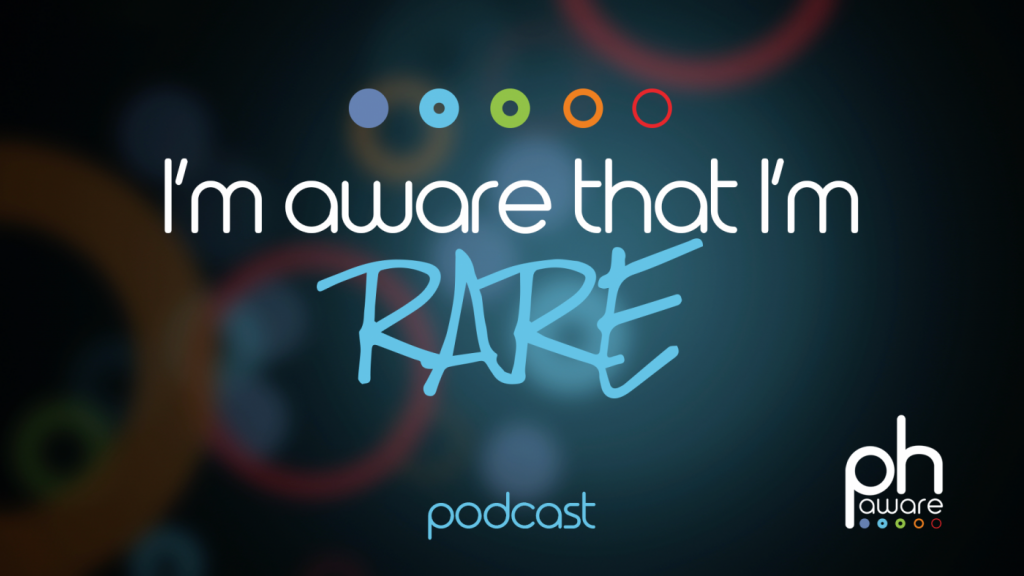Phaware Podcast: Roham Zamanian, MD, Part 1
Written by |

This podcast series, created and produced by phaware, is being offered as a regular guest feature on Pulmonary Hypertension News to bring the voices and life experiences of PH patients, family members, caregivers, healthcare specialists, and others to our readers. You may listen to the podcast directly, or read it via the transcript that runs below.
I’m Aware That I’m Rare: Roham Zamanian, MD
The phaware® interview (Part 1 of 2)

Dr. Zamanian is the Director of the Adult Pulmonary Hypertension (PH) Program at Stanford University Medical Center. In Part 1 of his 2 episode series, Dr. Zamanian discusses breakthrough interventions in clinical trials. He currently directs the Vera Moulton Wall Center clinical database and biobank, and focuses his research on the clinical characterization and impact of novel risk factors such as methamphetamine use, and biomarkers such as insulin resistance, in pulmonary arterial hypertension. Beyond industry clinical trials and registries, Dr. Zamanian has re-focused the research mission of the Stanford PH program by collaborating with basic science faculty and implementing several proof-of-concept and phase II clinical trials of novel therapeutics developed at Stanford University. Dr. Zamanian also serves on phaware’s Medical Advisory Board.
I’m Roham Zamanian. I’m the medical director of the pulmonary vascular disease program at Stanford University Medical Center.
Today we’ll talk about clinical trials.
Clinical trials are basically the experiments that prove or disprove the effectiveness, the safety, the tolerability and really the utility of either the  medications, [or] it could be a procedure, it could be really anything. A clinical trial is really the accepted method to testing medical interventions for diseases and conditions that we deal with in medicine.
medications, [or] it could be a procedure, it could be really anything. A clinical trial is really the accepted method to testing medical interventions for diseases and conditions that we deal with in medicine.
So, from inception to completion, it depends on the size and the scope of a clinical trial, but it’s much, much longer than the conduct of the clinical trial. So, for example, for medical clinical trials that are testing a therapy in patients, there’s often 10 or 15 years of basic and translational research that’s already been done to develop the background. There’s often several years of work to make sure that the intervention that’s being tested on humans will be safe. And then, depends on the scope of the study, and depends on which disease.
For example, in pulmonary hypertension, the studies that began at the very beginning of the therapeutic paradigms in pulmonary hypertension were 12-week studies. It doesn’t mean that the whole study was done in 12 weeks. But those studies tested an intervention, a medical therapy over 12 weeks time. They’re often preceded by several years of work to develop this clinical trial, to get the approval, to get the funding for the clinical trial, and really maybe a year or two after the completion of the clinical trial, to do the appropriate analysis and submit for publications.
So those were short days. These days, in pulmonary hypertension, or even in other diseases, people may be looking over several years period of time, to look at the effect of their intervention. So really it just really depends on what disease stage that the clinical trial is conducted, what the aims are, and what is acceptable to the community as a whole.
Historically, there’s a big body of literature in terms of ethics of clinical trial conduct. Out of several historical events in human history have come sets of understanding and [a] Bill of Rights for patients who undergo clinical trials.
So to be specific, I’m not sure if you’re aware of the Tuskegee Experiments, where African-American men in the Army were infected with syphilis and were not told about that. And the experiment was to see the impact of neurosyphilis on human function over a long period of time without therapy. Now, this came out, it was a big deal, it was totally unethical. So from these incidents, there is not a Declaration of Helsinki that provides the framework of safeguarding patients when they go into clinical trials.
So first of all, there is a major history to that. Second, most important, is that patients do need to know that for any appropriate clinical trial to be conducted, in First World countries, there has to be approval from an institutional review board, which will review the safety and the appropriateness of the conduct for that clinical trial.
There is, usually, the established method of a data safety monitoring board. The data safety monitoring board is specific to the study, that will continue to follow the study as it unrolls, and make sure that the intervention is appropriate for patients.
And also, each individual patient is consented, is given a Bill of Rights, and is given the option at any time to withdraw from the clinical study. So, first of all, there is tremendous and very important and necessary human protection that’s in there for any clinical trial, whether it’s in cardiac, respiratory, other diseases, cancer, et cetera.
The second part of it is — patients need to recognize, we as a group of physicians need to recognize — that the way that we can develop breakthrough interventions for patients is by having patients involved into the clinical trial. So we take care of the safety and appropriateness of the clinical trial.
And this might be a little bit controversial, but I tell my patients that if there is anything that I feel that they might have a responsibility [for], it may be the responsibility to be open to enrolling into clinical trials because I’m sure there are patients today that are benefiting from participation of patients from 10 years ago. And that their therapies are based on the experiments that were done on patients from 10 years ago.
So there is a risk benefit. We take huge lengths to protect subjects against harm. We don’t do anything that is inappropriate. And we must not. At the same time, yes, there is a risk benefit.
And often my patients ask me, “How about if I go into this study and I get the placebo?” And that’s a conversation we always need to have with the patients. It’s a necessary part of experimentation to have a control and those controls may be placebos. And for us to have evidence of either safety or efficacy or whatever is of the intervention that we’re doing.
Yeah, it may be that those patients will not get the supposed therapeutic benefit of an agent that’s being tested. But at the same time, it’s hard to know. If you’re testing a drug that hasn’t been proven to be effective, you really never know if the drug is going to help or not at the end.
So you know, it’s a very complicated conversation. But I think what I would want my patients to walk away from the conversations that I have with them is: A. Your safety is No. 1 priority. There are many, many institutional and investigator-specific actions that are taken primarily for the safety of the patients who are in the clinical trial. The second part of it is, we have do these clinical trials to be able to offer new potential therapies or other things that we’re testing to our patients. The final point is, I think we’re all in this together.
I’m Roham Zamanian and I’m aware that I’m rare.
EVERYBODY HAS A STORY. WHAT’S YOURS?
Phaware global association wants to share your pulmonary hypertension story with their engaged global audience. Whether you are a patient, caregiver, or medical professional, they are enlisting PH community members from around the world. Visit www.phawarepodcast.libsyn.com/contact to share your story and to be considered for a future episode. Never miss an episode with the phaware® podcast app. Learn more about pulmonary hypertension at www.phaware.global. #phaware
***
Note: Pulmonary Hypertension News is strictly a news and information website about the disease. It does not provide medical advice, diagnosis, or treatment. This content is not intended to be a substitute for professional medical advice, diagnosis, or treatment. Always seek the advice of your physician or other qualified health provider with any questions you may have regarding a medical condition. Never disregard professional medical advice or delay in seeking it because of something you have read on this website. The opinions expressed in this column are not those of Pulmonary Hypertension News or its parent company, Bionews Services, and are intended to spark discussion about issues pertaining to pulmonary hypertension.





Leave a comment
Fill in the required fields to post. Your email address will not be published.